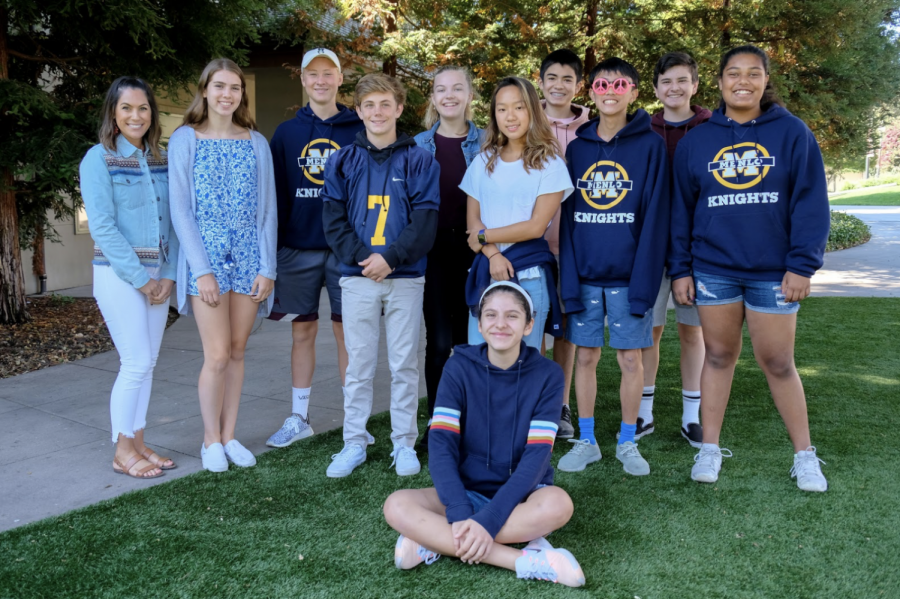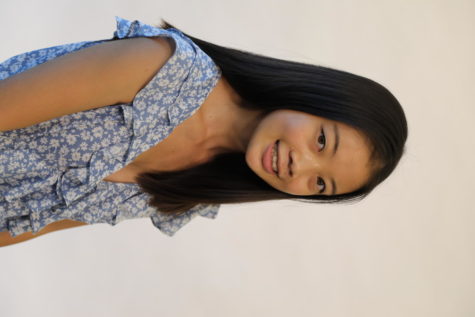Advocacy Program Builds Upper School Community
Lisa Giarratano and her freshman advocacy group who are already developing a strong sense of trust with each other. “By the time they’re seniors, I think we’ll know way too much about each other, which is fine!” Giarratano said. Photo courtesy of Pete Zivkov.
February 8, 2019
Menlo’s advocacy program is mostly successful in teaching students how to build community, as well as in giving each individual student a reliable support group at school. “My definition of [success] for advocacy, is that the students feel safe, they feel loved […] and their advocate is a wonderful resource and loves them,” Freshman Class Advisor and math teacher Eve Kulbieda said. “But [that] they’re also growing in terms of their ability to communicate and manage conflict and make decisions.”
During freshman year, students learn to trust and share with each other during advocacy meetings. “[The conversations are still] a little guarded at this point, but it’s getting better,” freshman Claire Lenden said. “Once we’re comfortable opening up about what we’re going through, we can relate to each other’s experiences, and that’s super helpful.”
“Our advocacy has already built a culture of trust. […] It’s a place where we can all chat,” Lenden’s advocate and college counselor Lisa Giarratano said.
Administration makes a big effort to ensure that freshmen get well-acclimated to Menlo’s community and expectations through advocacy. “The freshman program is unique just to the freshmen. [It’s] based on […] talking about community a lot and trying to set up class culture,” Kulbieda said.
During the sophomore and junior years, most advocacy groups start to feel more comfortable with each other. Despite having had three different advocates in the past, Junior Luke Virsik still believes his group has developed good relationships. “I don’t think that [having three advocates] has affected us as an advocacy at all,” Virsik said. “We’ve stayed with the same people, so it’s been alright.”
“I think each advocacy group has its own social dynamic,” Kulbieda said. “And I think that some advocacy groups grow closer, and some don’t.”
Senior Alejandro Ross has the same outlook on the program. “Each advocacy kind of chooses to create their own culture and have their own traditions,” he said.
Ross’s advocate and Upper School History Department Chair Ryan Dean thinks more frequent advocacy meetings would enhance the relationships in advocacy groups. “It [would help] the advocate help the student,” Dean said. “We [would] notice changes in their habits and behaviors more quickly [if advocacy met more than once each week].”
For many, the inclusion of food plays a critical role in creating the safe, inclusive groups that advocacy offers. “Food is essential,” Giarratano said. “I think getting people off their phones and computers as much as possible [also] contributes to a fun and positive environment because everyone’s present.”
By senior year, students and advocates within advocacy groups have formed various connections with each other. “[Advocacy] is a way of getting to spend time with people that normally in the school day, you don’t really spend time with,” Ross said. “You’re close with [some of the people in advocacy], and you’re less close with [other people in advocacy].”
Advocacy is a special program because it lasts the entire span of a Menlo student’s high school experience. “Just having four years together, I think, brings people together,” Lenden said.



